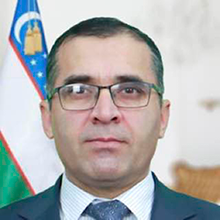Publications
Uzbekistan is creating its own model for combating corruption  Qodir Djuraev, MP, Legislative Chamber of Oliy Majlis (national parliament) of the Republic of Uzbekistan
Qodir Djuraev, MP, Legislative Chamber of Oliy Majlis (national parliament) of the Republic of Uzbekistan
One of the most crucial issues in the rapidly changing world is undoubtedly corruption. The human history suggests that this phenomenon brought even the most powerful nations to the brink of collapse.
Corruption is a perilous misfortune with negative impact on the entire human race, on foundation of any state and society, economic development; it undermines rule of law and sharply weakens public confidence in government, hinders advancement of democratic institutions.
Unfortunately, this problem has not been alien Uzbekistan. Until very recently, the latter had been known as one of those countries with highest perceptions of corruption.
READ MORE
Publications
The likeliest scenarios for tomorrow’s Russia  By Marat Terterov, PhD, Founder, and former Executive Director of the EGF
By Marat Terterov, PhD, Founder, and former Executive Director of the EGF
The folly of predicting Russia’s future
When undertaking the task of seeking to forecast a ‘likely scenario’ for tomorrow’s Russia, one has to start with a caveat – predicting Russia’s future and what fate awaits the country in light of its continued military excursion in Ukraine is like trying to find a needle in a haystack. In other words, it is almost impossible to predict future political developments in Russia with any real certainty. This includes any efforts to predict whether Russia will continue to remain the arch belligerent in Ukraine, or whether it will be prepared to make concessions, or to forecast what impact either (or other) of these developments in the current conflict in Ukraine will have on the Russian regime of Vladimir Putin.
READ MORE
Publications
What Does Azerbaijan Want?  By Benyamin POGHOSYAN, PhD, Chairman, Center for Political and Economic Strategic Studies
By Benyamin POGHOSYAN, PhD, Chairman, Center for Political and Economic Strategic Studies
After the military takeover of Nagorno Karabakh by Azerbaijan in September 2023 and the forced displacement of Armenians, there were some hopes in Armenia and abroad that an Armenia – Azerbaijan peace agreement was within reach. These hopes were based on the assumption that Azerbaijan received everything it could dream of just a few years ago.
After September 2023, Azerbaijan controlled the entire Nagorno-Karabakh, with only a handful of Armenians remaining there. The Armenian government accepted that reality with no intention to challenge it, while the international community did nothing tangible to punish Azerbaijan or create conditions to bring Armenians back. President Ilham Aliyev proved to everyone that he was not a “golden boy” who became president just because he was the son of a prominent leader – Heydar Aliyev – and lacked basic governance skills. He succeeded where his father failed, taking control over Nagorno Karabakh and raising Azerbaijani flags in Shushi and Stepanakert.
READ MORE
Publications
Will an Armenia-Azerbaijan peace agreement be indefinitely delayed?  By Vasif HUSEYNOV, PhD, Head of Department, AIR Center, Adjunct Lecturer, ADA and Khazar Universities, Baku
By Vasif HUSEYNOV, PhD, Head of Department, AIR Center, Adjunct Lecturer, ADA and Khazar Universities, Baku
2023 ended with positive notes for the Armenia-Azerbaijan peace process, but the new year has so far failed to maintain the momentum. Despite a successful prisoner exchange, and Armenia’s endorsement of Azerbaijan’s COP29 candidacy, recent statements from the respective governments have presented a mixed picture. While the Azerbaijani side has not indicated any setbacks in the ongoing talks yet, the Armenian government has criticized the recent statements by the Azerbaijani leader as unconstructive for the peace process.
Complicating matters further, disagreements have intensified regarding the possible regulations along the Zangezur corridor. The latest developments highlight a disparity in the visions of Russia, Armenia, and Azerbaijan for this corridor. Unfortunately, these developments suggest that the obstacles in the Armenia-Azerbaijan peace treaty talks may be more fundamental, potentially leading to indefinite delays in the process.
READ MORE
Publications
Is Aliyev sincere in his peace plans?  By Yeghia TASHJIAN, Beirut-based regional analyst and researcher, columnist, "The Armenian Weekly”
By Yeghia TASHJIAN, Beirut-based regional analyst and researcher, columnist, "The Armenian Weekly”
On January 10, 2024, Azerbaijan’s President Ilham Aliyev gave a 2.5-hour interview with local TV channels. In his interview, Aliyev not only repeated false remarks and justified the ethnic cleansing of the Armenians of Artsakh but also threatened Armenia. When it comes to delimiting and demarcating the Armenia-Azerbaijan border, he rejected the old Soviet maps proposed by Armenia, arguing, “In the 20th century, the lands of Azerbaijan were given to Armenia in parts. One day after the establishment of the Azerbaijan People’s Republic in 1918, the ancient Azerbaijani city of Erevan was handed over to Armenia. After the Sovietization in April 1920, in November, the Soviet government took the bigger part of Western Zangezur from Azerbaijan and handed it over to Armenia. By May 1969, Azerbaijani lands were given to Armenia in parts, and from an area of about 100,000 square kilometres, it dropped to 86,600 square kilometres.”
READ MORE
Publications
Assessment of poverty indicators in the Republic of Uzbekistan by the end of 2023  The CERR jointly with the Statistics Agency, assessed the level of monetary poverty in Uzbekistan. By the end of 2023, poverty in the country decreased by 3.1 percentage points. The experts explained how the poverty profile has changed and in which regions the incomes of the population have shown the greatest growth.
The CERR jointly with the Statistics Agency, assessed the level of monetary poverty in Uzbekistan. By the end of 2023, poverty in the country decreased by 3.1 percentage points. The experts explained how the poverty profile has changed and in which regions the incomes of the population have shown the greatest growth.
According to the results of the assessment of the Statistics Agency under the President of Uzbekistan, by the end of 2023, the poverty level in Uzbekistan has decreased to 11.0%.
READ MORE